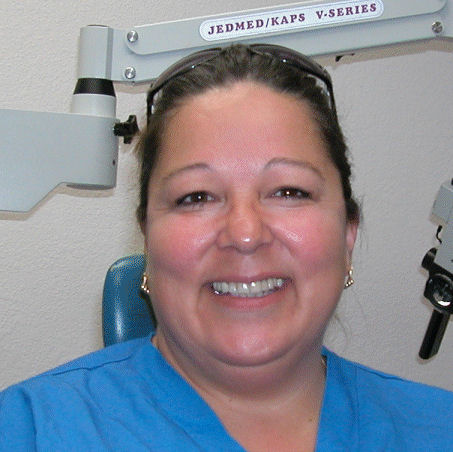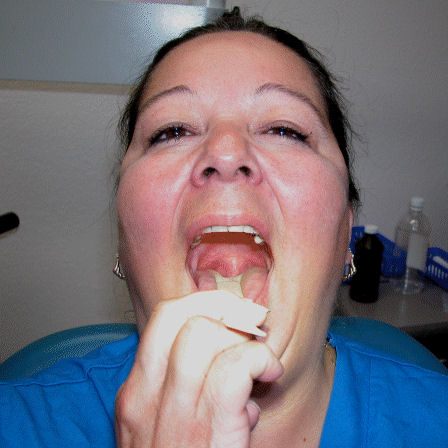Radiofrequency uvulopalatoplasty for snoring
Yeah, you read that title right. Sometimes I feel motivated to make a public service announcement. Not often, but sometimes, and tonight's the night. And since the chances are pretty good you (or your spouse) snores, I figure I won't lose too many of you with a relatively serious post.
This first bit is for my malpractice insurance carrier:
I am NOT offering medical advice; I am merely providing information. Read the disclaimer. It has flashy things and animated buttons to keep you entertained.
Another note: my victim patient, Jeannie, has given me permission to use her images in these blog posts. Wasn't that nice?

Look, she's even smiling about it.
Follow me below the fold for a discussion of snoring, obstructive sleep apnea, and the use of radiofrequency uvulopalatoplasty to successfully treat snoring.
While many people with obstructive sleep apnea snore, not everyone who snores has obstructive sleep apnea (OSA). What difference does it make? Pretty big one, actually. OSA can kill you (more on that in a moment), snoring can't (unless your bed partner decides to become fodder for the next season of Law & Order). We treat OSA differently than uncomplicated snoring, so it's important to learn right from the start which diagnosis the patient has.
Insurance companies wish docs could differentiate between these two diagnoses based on the history, physical exam, bed partner interview, or some simple radiologic procedure. They would like that very much because those "tests" are cheap, while the gold standard diagnostic procedure is expensive. But, unfortunately for the insurance companies, as well as folks who are under-insured or uninsured, the gold standard -- a sleep study -- is the only way to nail the diagnosis.
We don't like missing the diagnosis of OSA because of its health consequences. You'll learn from the linked article that OSA increases the risk of car accidents, depression, high blood pressure, heart disease, stroke, and death. Left untreated, OSA of sufficient severity decreases your life expectancy.
But let's say you've had your sleep study and you don't have OSA. You snore. That's it. And that's enough. What do you do now?
The sprays you can buy in the drugstore and pills you can buy online don't work. If my son weren't angling for this computer right now, I'd take the time to dig up the reference, but trust me -- some ENTs took a close look at these over the counter "cures" a few years ago and found them inefficacious. That leaves us with the two most common surgical treatments: LAUP (laser-assisted uvulopalatoplasty) and RAUP (radiofrequency-assisted uvulopalatoplasty).
They work by the same method. The idea is to injure the muscle of the soft palate, thus scarring the muscle. This shortens and stiffens the soft palate. Either method can be used to shrink an enlarged uvula, too. The two methods differ in the type of energy used: laser versus electrical current. Yes, "radiofrequency" is a polite, nonthreatening way of saying "electrocution". Sneaky bastards, aren't we?
The two methods have one other big distinction: pain. In order to injure the muscle of the soft palate, the laser has to burn its way through mucosa. With RAUP, we use an insulated needle electrode to bypass the mucosa and go directly to the muscle. The mucosa sustains much less injury than with LAUP. Since sensory nerves are more prevalent in the mucosa than in the muscle, LAUP hurts. In fact, depending upon whom you talk to, the pain is legendary. LAUP? Not so much. Most of my patients use ibuprofen, or if they use any narcotic at all, they're off it within two or three days.
Which brings us back to Jeannie. Say "AH":

Notice that you can't see Jeannie's uvula. Her soft palate is excessively long, so long that her uvula is hidden by her tongue. Even when she presses down with a tongue depressor, her uvula is still playing shy. Compare that photo to this diagram.

In a RAUP, I zap the uvula and soft palate in six or seven different locations. First, however, I inject local anesthetic into the soft palate. This is the least pleasant part of the whole affair, but honestly, it's not much worse than dental work requiring local anesthesia. Once the soft palate is numb, we begin.

The electrode administers a low current to the tissue. Again, it's only the tip which is uninsulated. The portion of the electrode in contact with mucosa is insulated. The muscle takes the hit, not the mucosa, which is just the way we like it.
Jeannie will return in four weeks for another treatment. In my experience, it takes three or sometimes four treatments (and sometimes more than that) to create a happy bed partner. That's the endpoint of treatment, by the way -- not "no snoring," which is difficult and unrealistic, but "my husband sleeps through the night, now," which is really all that matters.
Does it work? I've been a bad scientist -- I haven't tracked my own results -- but my impression is, at least 75% to 80% of my patients are happy customers. I've been doing this for nine years, and I've had relatively few outright failures. In this study, the success rate was 85%.
Most people complain more about post-op swelling than pain. With successive treatments, swelling becomes less of an issue, pain somewhat more, but it's still manageable with ibuprofen or a few days of a weak opiate. Complications are few: if the electrode is too close to the mucosa, you can get an ulceration, which is a tiny version of what LAUP does on the grand scale. Theoretically, bleeding, infection, and excessive swelling can occur, but in my experience the complications are limited to swelling and pain.
Well, Jake wants this computer, so I'll wrap it up. Any questions?
I'll keep you posted on Jeannie.
D.
Cross-posted at Balls and Walnuts.


12 Comments:
That's a good treatment for snoring people. I agree with that. However, there are people who can't afford such treatments. It sounds like it costs next to surgery, correct me if I'm wrong. So to add, there are also natural remedies for snoring. Sample is like sewing a tennis ball at the back of a snorer's pajamas. In that way, he won't be able to lie on his back so he can avoid himself from snoring. There are also treatments which you can buy from stores like throat sprays or pillows that will let you minimize your snoring habits.
'Snoring treatments' natural remedies have failed me; I had Pillar in Oct 07. One has extruded & removed; two others 'migrating'. Feel like I have a lump in my throat all the time now; snoring worse (no apnea, just a bad bed partner for my husband). Next steps? (FYI, I can see my uvula)
The throat sprays, pillows, etc. have been debunked. The tennis ball method works only if the person's snoring is positional -- but if it is, he's in luck, because you can't come up with a cheaper solution!
prnguin: I've steered clear of the pillar procedure because I've heard too many stories of extruding implants. For what it's worth, I've had very few patients report a foreign body sensation from this procedure.
I had the pillars about a month ago. One seems to be trying to extrude. My snoring is a lot worse than before. The pillars have added to the weight of my palate or something because now I snore on inhalation AND exhalation. It has also made my sleep apnea worse. I don't know how these things ever got approved by the FDA. I am thinking about having them all removed. Has anybody at this blog done that? The whole thing has been a major disappointment for me. Thanks for listening.
I wish I could find more anecdotal stuff from people who have had uvulopalatoplasty done. I am suppose to next week and your post here is about as anecdotal as I have found.
This procedure seems to be the equivalent of very expensive surgery. However, if it does work for some people, then they should explore this option. There are many Snoring Solutions on the market. But one of the easiest and cheapest is simple throat and jaw exercises.
this information served me as a person who snores I thank you and the degree to control and reduce the sound, with this I have a better relationship with my girlfriend
I've read that this LAUP can give side effects such as what have been mentioned here, but it did not say that they would be manageable.
Thanks.
By the way, is jeannie still alive now? lol
Thanks for your advice.
You made some good points there. I did a search on the topic and found most people will agree with your blog.
Hello
You can do a number of things that will help to reverse the depletion of neurotransmitters by Phentermine. The first is, as mentioned in Section 2, therapy using the basic amino acids that promote production of neurotransmitters. To undergo therapy, you can take two supplements which are currently known to improve the situation.
Article Source: http://EzineArticles.com/28620 Read more at- phentermine
thanks
Hello
When asking how does phentermine work look closely at one of the precautions that are listed on the bottle. It is a warning against taking them if you have, or have had a history of, "emotional problems". Since it reacts with chemicals in your brain, it can also negatively affect your moods. Most people facing obesity problems do struggle with depression. Even if they are upbeat and positive about finally getting into shape, there are bad days in any weight loss endeavor.
Article Source: http://EzineArticles.com/320259
Read more at- phentermine diet pills
thanks
Post a Comment
<< Home